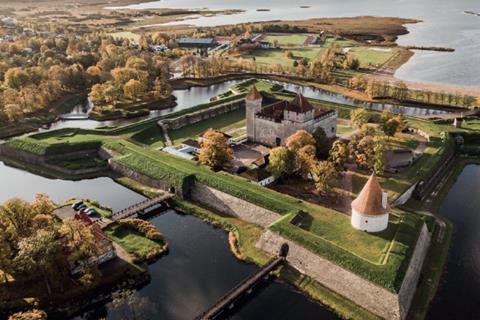
”Estonia may be a small country but there are all kinds of funding options on offer to international producers wanting to shoot here,” says Estonia’s film commissioner Nele Paves. “You can combine everything from the Estonia Film Institute’s minority co-production and the Film Estonia cash rebate through to the regional funds.”
Estonia’s first regional fund, the Viru Film Fund, in a region located 160km east of capital Tallinn, on the border with Russia, was established in 2013. Since then the Tartu Film Fund (2015), the Film Fund of Estonian Islands (2019) and, most recently, the Parnu County Film Fund (2023) have been created.
All the funds require the application for funding to be made by a legal person registered in Estonia and that at least 50% of the film’s financing is guaranteed when making the application.
However, the level of cash rebate available differs from one regional fund to the next. The Viru Film Fund has a 2024 budget of $216,000 (€200,000) and can provide a rebate of up to 40% of the eligible costs incurred by the applicant in the Ida-Viru Country region. The Parnu County Film Fund has an annual budget of $108,000 (€100,000) and has set its rebate at a maximum of 25%.
While the Parnu fund is yet to support any projects, the coastline near Tostamaa played host to one of the first large-scale co-productions to come to Estonia: German director Chris Kraus shot the historical drama The Poll Diaries on Matsi beach in the western part of Parnu County in summer 2009.
Meanwhile, the Islands fund, which has an annual budget of $32,000 (€30,000) from the Saaremaa and Muhu municipalities, decides the level of its rebate on a case-by-case basis.
To date, this fund has provided support for the Estonia-Latvia-Germany-Lithuania co-production of Elmo Nuganen’s medieval crime trilogy Melchior The Apothecary, Taska Film’s comedy The Vacationers, which was the second most-popular film at the Estonian box office in 2023 after Barbie, and Three Brothers’ co-production of Swedish filmmaker Frida Kempff’s The Swedish Torpedo, which was inspired by the story of Sally Bauer, the first Scandinavian woman to swim across the English Channel in 1939.
While the production incentives are naturally one reason for deciding to bring a production to Estonia, the wide range of locations on offer in the territory present another compelling attraction.
“Estonia is very small and compact. Within a short distance you can access very different landscapes that can resemble the Scandinavian coast, the UK or very multicultural environments with small villages, wild nature and cities where East meets West,” says producer Elina Litvinova of Three Brothers.
More than 30 productions have been supported so far by the Viru Film Fund. They include Three Brothers’ production of Martti Helde’s documentary Vertical Money, Moonika Siimet’s feature Black Hole, Taska Film’s Second World War spy thriller Dawn Of War by Margus Paju and Melchior The Apothecary, which filmed in locations at Narva museum, Purtse castle and in Laane‑Viru County.
“Our editorial preference is for historical features, so the Viru region has been perfect for that,” says Taska Film’s Adeele Tahemaa. “In 2025, we will be shooting the 1980s-set youth film Dirt In Your Face by Jaak Kilmi, which received support from the Viru Film Fund and will be shot extensively in the region.”
Up on the coast, Sillamae — with its reputation as a “secret place” for the Soviet Union’s chemical and nuclear industry — proved to be an ideal stand-in for a 1930s Soviet city when Finnish producer Ilkka Matila of Matila Rohr Productions was looking for an alternative to Russia’s Karelia region in 2016-17 for the shoot of Antti-Jussi Annila’s drama The Eternal Road.
“All the locations were easily accessible, the roads were in good condition, the distances short and a professional, English-speaking crew was easy to hire. And there were plenty of international flights for our actors from Copenhagen, Stockholm and Helsinki,” Matila says.
“While the director, DoP, focus puller and first AD came from Finland, the rest of the crew including the heads of department were Estonian,” he adds.
Indeed, international productions have increasingly found they can recruit heads of department from the local industry — ranging from Christopher Nolan’s 2020 blockbuster Tenet through Peeter Rebane’s 2021 romantic war drama Firebird to Ben Parker’s 2022 war thriller Burial.
Presented by:























